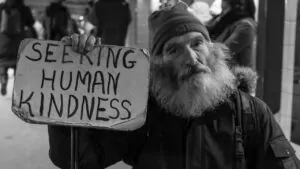The Compassion Responsibility Connection
by Robert Hackman
Photograph by Matt Collamer on Unpslash
Everybody needs compassion
If you want to be healed
Then know you got to feel compassion
From the song ‘Compassion’
By Todd Rundgren
I hear it frequently. ‘I need to hold myself more accountable.’ Usually spoken by someone admonishing themselves for not being more responsible, for not following through more resolutely with their expressed intentions.
What happens next is fascinating. I see it in myself too. You berate yourself for not being better. The correlation made is that beating yourself up will lead you to your desired conduct.
It sounds reasonable. We failed. Therefore, we deserve the stick. Our desire to avoid pain will make us change our behavior.
The logic is that the management of self and others is based on getting people to do the things they would not do on their own. Thus, coercion is required.
The major flaw is that it does not work that way. Instead, doing so causes us to feel lousy. Rather than direct our energies and focus on altering our actions, we channel them into confirming how defective and deficient we are, making us less likely to make the adjustments we claim to want.
Ouch! Rinse and repeat. As singer/songwriter John Fogerty sings, ‘It’s like Déjà vu all over again.’ You end up grinding yourself down in unhelpful ways.
It is a well-worn and broken routine and a bad combination. It causes you to feel inferior, and it doesn’t work.
Unfortunately, this belief also determines how many teams and organizations are run.
It impacts how we show up in our relationships at work and in our personal lives. We are all in need of human kindness. It starts with compassion.
Are you willing to realize you need another way? What if compassion is a requirement for change? How would appreciating the inextricable link between kindheartedness and responsibility change how you lead?
I have been coaching a senior leader for several months. He takes responsibility for developing and refining the company’s culture, continually seeking to align and integrate it with its strategy. Hank is also responsible for executing the firm’s operations. He inhabits the tension between maintaining and elevating performance standards while ensuring people feel fully supported.
His predicament is our own.
The answer is both. Yet, responsibility does not matter without compassion. People do not care how much you know until they know how much you care. That includes your relationship with yourself.
Compassion heals, energizes, and connects you. It shifts your attention outward towards helping others. Admonishment harms you, draws your focus inward, and isolates you.
Despite experiencing this yourself, you believe responding to others this way will have different results. You feel compelled to address infractions decisively, head-on, and with force. You, after all, are a leader who accepts nothing but the best and strives for perfection.
Except we are not perfect. Every organization I have ever been in or worked with as an executive coach or consultant has done a ton of things wrong. Fortunately, they have all done much more right. That is a feature that makes group facilitation so vital. Good facilitation unearths what is not being said and calls forth the needed conversations that are not being had.
Even if we are unwilling to admit it, we all feel vulnerable. That is why we armor ourselves up and make sure to put our best face forward.
Sustained change begins with acceptance and compassion. Only then have we earned the right to insist on behavior change from ourselves and others.
Compassion creates the space for genuine dialogue that enlists the commitment of us and others to do better. It provides the psychological safety required for uncommonly candid conversations.
Rather than relying solely on the push of management in the form of carrots and sticks. The process draws on the pull of leadership, which comes from within – making it significantly more sustainable.
When we behave without kindness, we ignore our humanity and reduce ourselves and others to means or obstacles to getting things done, which is inherently unfair and ineffective.
Introducing compassion may take longer initially, yet it enables speed and efficiency in the medium to long term.
It is worth asking yourself what keeps you from being more kind. Especially if practicing kindness provides the pathway for change and increased responsibility.
Try adding compassion to grow leadership. You will find it helps you live and lead with fewer regrets.
Worthy Inquiries:
- Does berating yourself and others when you fail to live up to your desired standard raise your level of responsibility?
- For what are you responsible? What roles do kindness and compassion take in accountability?
- Can you practice compassion without letting yourself and others off the hook? In what ways does compassion induce responsibility?
- How do your beliefs about the relationship between compassion and responsibility influence how you lead?
- What is the point of leadership without love and kindness?
Please reach out to me for help navigating the relationship between compassion and responsibility to benefit yourself, your team, and your organization. I welcome the conversation.
Robert Hackman, Principal, 4C Consulting – Courageously Curious Consulting and Coaching, helps people live and lead with fewer regrets. He grows and develops leaders through executive coaching consulting, facilitation, and training of individuals, teams, and organizations. He is committed to Diversity, Equity, and Inclusion. He facilitates trusting environments that promote uncommonly candid conversations. Rob is also passionate about the power of developing Legacy Mindsets and has conducted over 50 Legacy interviews with people to date.
A serious man with a dry sense of humor who loves absurdity can often be found hiking rocky elevations or making music playlists. His mixes, including Pandemic Playlists and Music About Men, can be found on Spotify.

